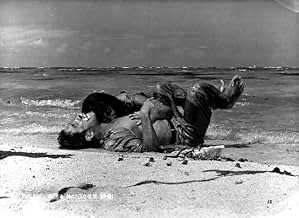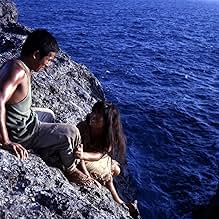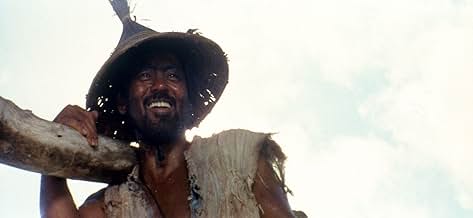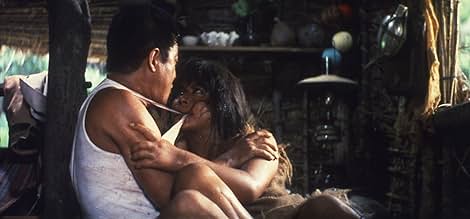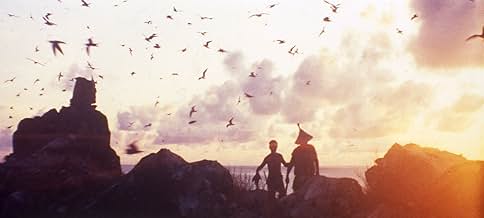IMDb RATING
7.5/10
2.1K
YOUR RATING
An engineer from Tokyo arrives on a drought-ridden tropical island to drill a well to power a nearby sugar mill. He meets the inbred Futori family, hated by the locals for breaking religious... Read allAn engineer from Tokyo arrives on a drought-ridden tropical island to drill a well to power a nearby sugar mill. He meets the inbred Futori family, hated by the locals for breaking religious customs.An engineer from Tokyo arrives on a drought-ridden tropical island to drill a well to power a nearby sugar mill. He meets the inbred Futori family, hated by the locals for breaking religious customs.
- Director
- Writers
- Stars
- Awards
- 5 wins & 1 nomination total
- Director
- Writers
- All cast & crew
- Production, box office & more at IMDbPro
Featured reviews
Trying to acknowledge the enigma of Japanese Cinema, outside the paddock of Akira Kurosawa (Seven Samurai) and Yasujiro Ozu (Tokyo Story), is a daunting yet arousing act. With Profound Desires of the Gods (1968), Shõhei Imamura redefined the rigorous notions of 'Japaneseness'. Because the Futori family retain the traditional belief that their island of Kurage was created through the sexual union of a brother god and sister goddess, the other more progressive islanders vilify them. When a Tokyo engineer arrives to supervise the creation of a new well, he unearths the mystifying extremism of the Noro (shaman). With Profound Desires, Imamura examines the dogma of Japanese mythology and investigates the disparaging effect of modernity and the ruinous consequence of Coca-Cola. It is a sizzling masterwork filled with Buñuelian surrealism, which deftly captures the alchemy of the natural world.
I trust the director fully and his choices in course of action, this is truly the work of a master. Speechless. But I'll try to do a short review for my own sake.
Profound Desire of the Gods immerses one, for nearly three hours, in the community of Kurage, located in the in the tropics, on a small island with jagged cliffs, lost in the middle of the Pacific. Its amazing, from the wide and exotic photo to the allegorical representations of the human condition.
Profound Desire of the Gods immerses one, for nearly three hours, in the community of Kurage, located in the in the tropics, on a small island with jagged cliffs, lost in the middle of the Pacific. Its amazing, from the wide and exotic photo to the allegorical representations of the human condition.
Profound Desires of the Gods, sometimes referred to as Imamura's overlooked epic, is an ambitious undertaking. Running at a daunting 173 minutes, it is ostensibly the tale of one inbred Ryukyu family's (the Futoris) attempts to regain lost social status. They do this by digging a pit to bury a huge boulder, and by seducing a mainland engineer with the feral, sexually-charged wild-child daughter. On another level, the film interrogates issues of modernity versus tradition, religious hypocrisy, and Japan's troubled relations with the outside world.
The film's successes are its luscious landscape, evocative production design of heathen and pagan rituals and artifacts, and portrayal of suppressed, taboo desires bursting to the fore. The narrative wanders and explores various tangents that can challenge the attention. This is filmmaking for cinema, and the gorgeous golden beaches and turquoise oceans had me longing to see this on the big screen. A murder by masked men at the end is also visually compelling. This film is interesting in bits, and flashes of genius occasionally show themselves, but the lack of coherence, repetition in the storyline, and outright dud moments (the heavenly vision of the departed patriarch), make this a problematic addition to the Imamura oeuvre. It hints at the great film that this project could have become, a realization of the potential of the vision, rather than the vision itself. Sometimes amazing, sometimes disappointing, this is one to watch and argue over.
The film's successes are its luscious landscape, evocative production design of heathen and pagan rituals and artifacts, and portrayal of suppressed, taboo desires bursting to the fore. The narrative wanders and explores various tangents that can challenge the attention. This is filmmaking for cinema, and the gorgeous golden beaches and turquoise oceans had me longing to see this on the big screen. A murder by masked men at the end is also visually compelling. This film is interesting in bits, and flashes of genius occasionally show themselves, but the lack of coherence, repetition in the storyline, and outright dud moments (the heavenly vision of the departed patriarch), make this a problematic addition to the Imamura oeuvre. It hints at the great film that this project could have become, a realization of the potential of the vision, rather than the vision itself. Sometimes amazing, sometimes disappointing, this is one to watch and argue over.
A very candid and often uncomfortable examination of traditional cultures and their survival into modernity.
This movie has a rich and distinctive rhythm, immersing itself in the natural world. Sometimes sort of funny in a messed up way, it also has a very dark core.
I especially liked the humdrum little clerk finding a new part of himself in his relationship with the mentally disabled girl. I don't know if it's an insensitive portrayal but it adds to the movie's rawness.
I've never seen a movie quite like it even if I ultimately watched it in two sittings.
This movie has a rich and distinctive rhythm, immersing itself in the natural world. Sometimes sort of funny in a messed up way, it also has a very dark core.
I especially liked the humdrum little clerk finding a new part of himself in his relationship with the mentally disabled girl. I don't know if it's an insensitive portrayal but it adds to the movie's rawness.
I've never seen a movie quite like it even if I ultimately watched it in two sittings.
A pantheistic society on a remote island in the Pacific find themselves in desperate need of fresh water. They invite Tokyo engineer Kariya to find the best sources of water in the area in order to pump it. As the story begins to unfold, Imamura lays out contrasting aspects of human nature by comparing Kariya's rational, scientific thought and the islanders' intuitive, spiritual vision of the world. (According to something said in one of the DVD's extra features, the island in the story was inspired by Okinawa, whose culture at the time still preserved some aboriginal characteristics and was different from most of Japan.)
Things begin to get more interesting when, to his utmost surprise, engineer Kariya is faced with some very primal needs of his own. At the same time, some of the island residents seem ready to put behind their adoration of the gods (sometimes dismissed as 'superstition') in order to concentrate on more practical matters. Others, like the Futori - an incestuous family regarded as beastly even by their neighbors' standards - prove to be particularly resistant to change.
I believe the Japanese director is addressing some of psychiatrist Carl Jung's ideas regarding the unconscious and man's innate need for myth. In his book, 'Man and His Symbols', Jung explains that in prehistoric times, man used to be completely intuitive and animalistic. Through a process of thousands of years, we've become more civilized and scientifically advanced. Yet, the primitive, emotional, non-rational aspect remains perfectly alive in our unconscious and cannot be fully tamed. This interior wilderness manifests itself in different ways, sometimes to our embarrassment, despite our best efforts to control it (a recurring theme in Imamura's films). Because our very existence and such a substantial part of who we are remain such a mystery to us, we use myth and a variety of symbols in an attempt to deal with these powerful, often puzzling, numinous forces within and without.
On a historical note, Imamura was allowed to work with a relatively large budget, but the film proved perhaps too strange and intellectual to please large crowds. This resulted in financial losses and the director vowed to never work with a large studio again.
Surreal and comical (although not outrageously so, like Imamura's last feature film, 'Warm Bridge Under the Red Bridge') 'Profound Desires of the Gods' leaves you with what could be described as a strong sense of psychic intensity.
Things begin to get more interesting when, to his utmost surprise, engineer Kariya is faced with some very primal needs of his own. At the same time, some of the island residents seem ready to put behind their adoration of the gods (sometimes dismissed as 'superstition') in order to concentrate on more practical matters. Others, like the Futori - an incestuous family regarded as beastly even by their neighbors' standards - prove to be particularly resistant to change.
I believe the Japanese director is addressing some of psychiatrist Carl Jung's ideas regarding the unconscious and man's innate need for myth. In his book, 'Man and His Symbols', Jung explains that in prehistoric times, man used to be completely intuitive and animalistic. Through a process of thousands of years, we've become more civilized and scientifically advanced. Yet, the primitive, emotional, non-rational aspect remains perfectly alive in our unconscious and cannot be fully tamed. This interior wilderness manifests itself in different ways, sometimes to our embarrassment, despite our best efforts to control it (a recurring theme in Imamura's films). Because our very existence and such a substantial part of who we are remain such a mystery to us, we use myth and a variety of symbols in an attempt to deal with these powerful, often puzzling, numinous forces within and without.
On a historical note, Imamura was allowed to work with a relatively large budget, but the film proved perhaps too strange and intellectual to please large crowds. This resulted in financial losses and the director vowed to never work with a large studio again.
Surreal and comical (although not outrageously so, like Imamura's last feature film, 'Warm Bridge Under the Red Bridge') 'Profound Desires of the Gods' leaves you with what could be described as a strong sense of psychic intensity.
Did you know
- TriviaOfficial submission of Japan for the 'Best Foreign Language Film' category of the 42nd Academy Awards in 1970.
- Quotes
Yamamori Futor: He shouldn't take money. The engineer is a god who came from beyond the sea. It will not do to take money for serving that god.
- ConnectionsFeatured in Cinéma, de notre temps: Shohei Imamura, le libre penseur (1995)
- How long is Profound Desires of the Gods?Powered by Alexa
Details
- Release date
- Country of origin
- Language
- Also known as
- Le profond désir des dieux
- Filming locations
- Ishigaki-jima, Ryukyu Islands, Japan(Spelling error)
- Production company
- See more company credits at IMDbPro
Contribute to this page
Suggest an edit or add missing content

